Art History Abroad Final
1/85
There's no tags or description
Looks like no tags are added yet.
Name | Mastery | Learn | Test | Matching | Spaced |
|---|
No study sessions yet.
86 Terms
mannerism characteristics
opposite of renaissance and trying to undo, no 3rd dimension, no perfect light, and no perfect anatomy, everything exaggerated and wrong
mystical literature and deformation in the el greco portraits
soul is trapped in the body, so having a deformed face or body means you have a deformed soul (santa teresa de avila), being a bad christian leads to internal conflict
el greco bio
byzantine icon, born in crete, studied in Greece and Rome, arrived to Spain (toledo), and lived there rest of his life
mystical dialogue
conversation between 2 saints from different times to only possible that this conversation took place in heaven
diopsia
splitting canvas into 2 points of attention
protestant reformation
Martin Luther rejected the catholic church’s emphasis on Mary and the saints and more on just Jesus
counter-reformation
catholic resurgence in response to protestant reformation, 16-17th centuries, against Martin luther, more saints and more virgin mary, baroque
council of trent
meeting where they tried to attack protestantism, define catholic doctrine and make decrees on self-reform, revitalize the roman catholic church during protestant expansion, because of this religious themes multiply to spread the stories of new saints and retell ancient ones, saints are normal people = gente de la calle
baroque characteristics
realism or naturalism, light (tenebrism or luminism)
tenebrism
a single gleam coming from an elevated and exterior source, emphasizes one part of the picture, leaving the rest of the painting in darkness or shadow
luminism
several gleams or different illuminations focus in the picture, whole composition illuminated but with different intensities
arrepentimientos
can see the change in a painting with the naked eye
rubens’ influences on velazquez
switch from tenebrism to luminism, going to italy, changing career path to want to be a noble painter not a worker
goya tapestries cartoons
started as sketches that turned into cartoons before being turned into huge tapestries at the royal factory of tapestries, the cartoons were kept in case something happened to the tapestries but now are famous art pieces
goya portraits and problems
he did not try to beautiful the people he portrayed or depict them in a manner that they would necessarily like, pissed off the royal family because they had to see what they actually look like (which was usually ugly)
differences with velazquez and titian equestrian portraits
velazquez = sense of movement and immediacy, more active, less idealized depiction of the rider
titian = emphasize emperor’s authority and victory with calm, stoic pose
las majas revolution and identity
no one had painted a naked woman before, goya painted the real her, not as a mythological goddess, she wasn’t trying to cover herself and has pubic hair, we don’t know who she is
paintings about war
goya paintings about napoleon invasion, may 2nd and may 3rd 1808
black paintings
goya impacted by illness, leading to darker, more introspective works, loss of his wife and 11/12 children, represent his disastrous personal life
modernism characteristics
beginning 20th century, deliberate break from traditional forms and conventions, focus on subjective experience, internal consciousness, spirit of experimentation
gaudi
mid 19th century to early 20th century, park guell and sagrada familia
sagrada familia
in barcelona, modernism, by gaudi, took forever to build because only funded with charity and donations
avant-gardes
20th century, cubism and surrealism (picasso and dali)
cubism characteristics
include the 4th dimension, movement, and time
surrealism characteristics
combination of reality and dreams/conscious and subconscious
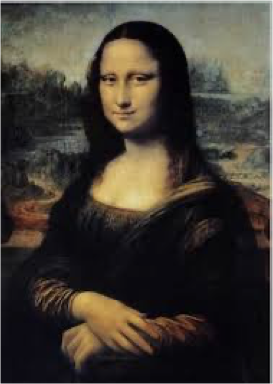
mona lisa, leonardo da vinci, renaissance, 16th century, focus on light, sfumata (no lines, just light and shadows), same faical features as Da Vinci = some people think might be his self-portrait because he was gay
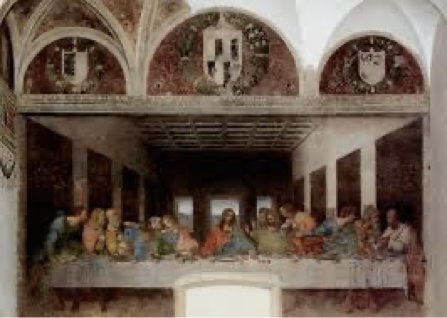
the last supper, leonardo da vinci, renaissance, 16th century, focus on light, sfumata, and aerial perspective, mural, began to decompose, he was an inventor and liked to do weird new things with art, piece of wood on a wall and began to rot
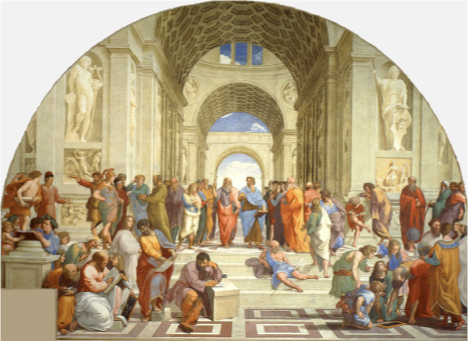
the school of athens, raphael, renaissance, 16th century, composition = mathematical/linear perspective, geometry and symmetry, ancient philosophers (rebirth of the ancient age), faces of Italian people and portraits of famous Italians of the time
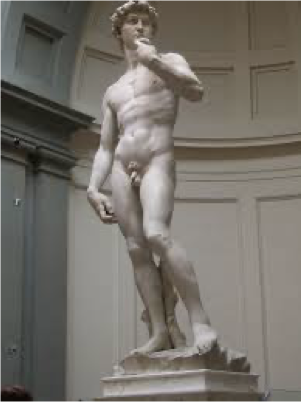
david, michelangelo, renaissance, 16th century, focus on anatomy, only 1 block of marble, in florence, male anatomy (even though he’s supposed to be young and looks old), stone in hand about to attack goliath, lean in hip because learned about anatomy of standing and leaning (hip curve) in italy
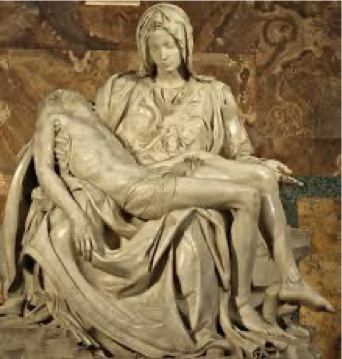
pieta, michelangelo, renaissance, 16th century, focus on anatomy, statue, death of jesus, can see how scrawny he is
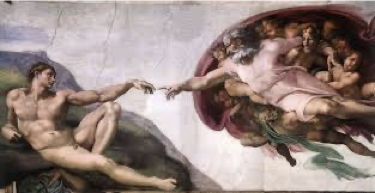
adam creation, michelangelo, renaissance, 16th century, focus on anatomy, god in a brain shape because secret dissections to focus on anatomy, God in heaven provide adam a human brain superior to other animals
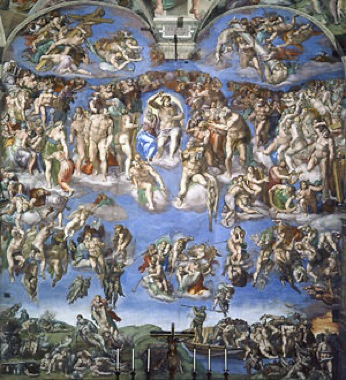
last judgement, michelangelo, renaissance, 16th century, focus on anatomy, in sistene chapel, everyone naked and exaggerated features, new testament
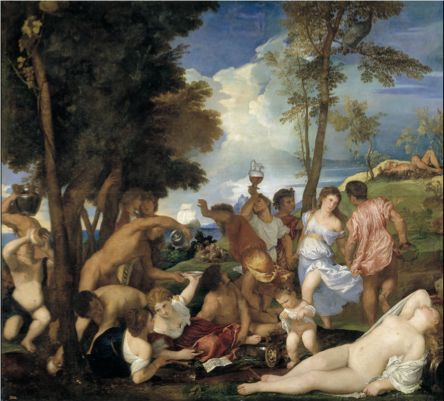
bacchanal, titian, renaissance, 16th century, focus on intense color
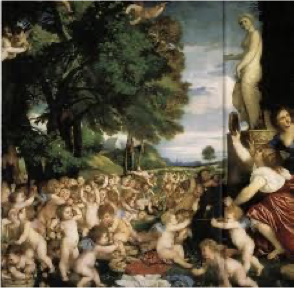
the worship to venus, titian, renaissance, 16th century, focus on color, lots of naked babies
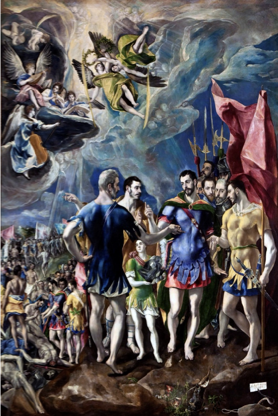
martyrdom of st maurice (el escorial), el greco, mannerism, 2nd half 16th century, christians sacrificed and dying for their faith, king liked the painting but not inside the church because it was too difficult to understand and the emphasis was seen more placed on the men talking than the man being executed
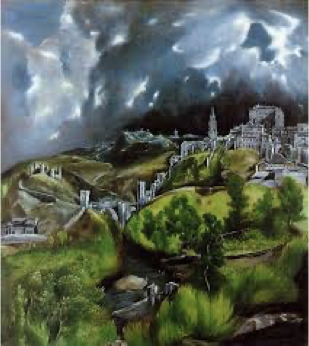
view of toledo, el greco, mannerism, 2nd half 16th century, can see the bridge, el greco first arrived to spain
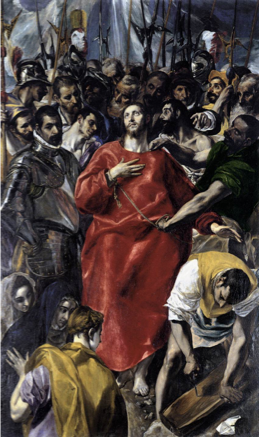
disrobing of jesus (toledo cathedral), el greco, mannerism, 2nd half 16th century, in toledo cathedral, jesus naked to be crucified, looking up at light asking god why, he wanted to be paid but cathedral was poor so there was a 10 year trial where they pointed out mistakes: people are painted above jesus, virgin mary and other women about to see him naked (not in bible), guy wearing outfit of the current time and not time of jesus, compromise and greco won money but cathedral never took another greco painting
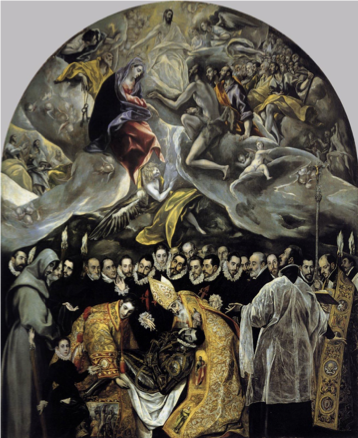
the burial of count of orgaz, el greco, mannerism, 2nd half 16th century, in toledo, separation of heaven and earth, gold of saints to bring his body to heaven, el greco self portrait, portraits of famous local men, virgin mary, angels, and saints in the heavens el greco’s success
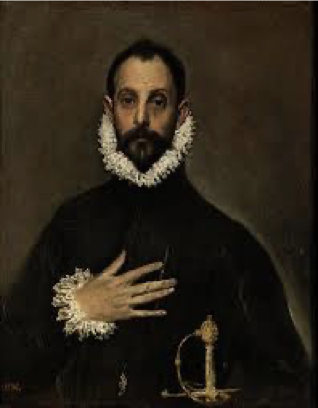
nobleman with his hand on his chest (portrait), el greco, mannerism, 2nd half 16th century, hand like that to show tension and mastery of painting hands
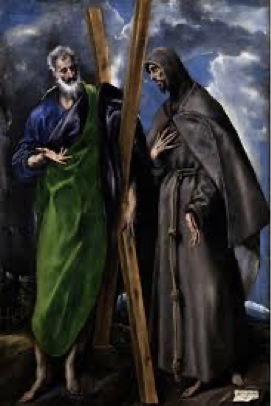
st andrew and st francis, el greco, mannerism, 2nd half 16th century, religious painting (mystical dialogue)
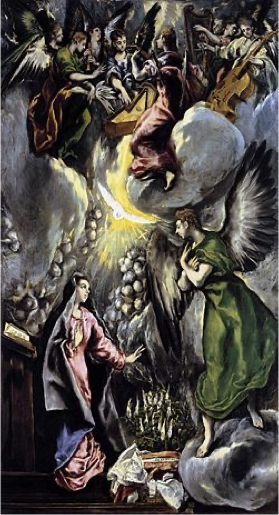
anunciation, el greco, mannerism, 2nd half 16th century, religious painting
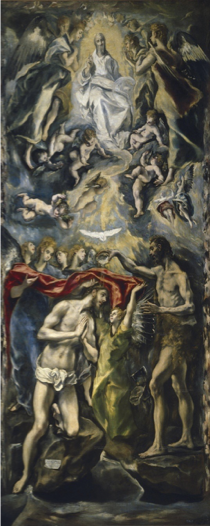
jesus baptism, el greco, mannerism, 2nd half 16th century, religious painting
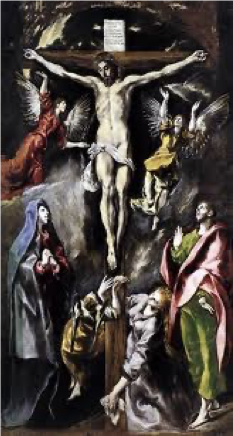
crucifixion, el greco, mannerism, 2nd half 16th century, religious painting,
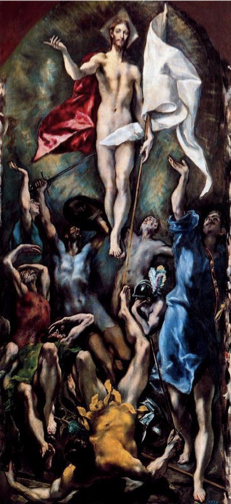
resurrection, el greco, mannerism, 2nd half 16th century, religious painting, elongated and deformed bodies
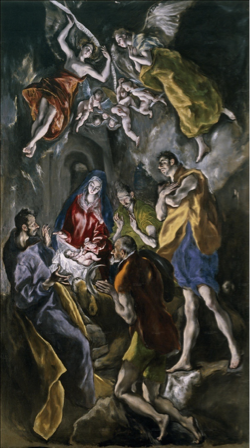
adoration of the shepherds, el greco, mannerism, 2nd half 16th century, religious painting, light coming from baby jesus
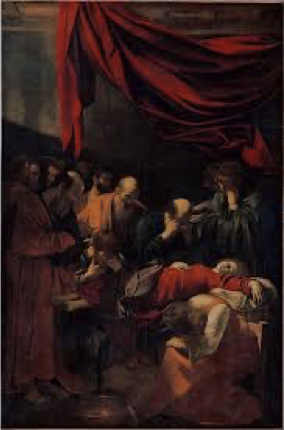
death of mary, caravaggio, baroque, 17th century, model for the picture was actually a prostitue who drowned that he dragged out of the river
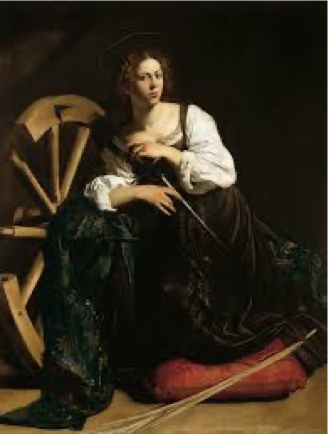
saint catherine, caravaggio, baroque, 17th century
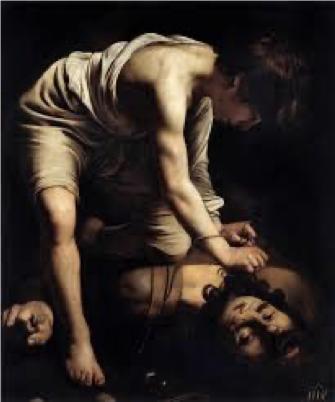
david and goliath, caravaggio, baroque, 17th century, after david’s killing of goliath, david looks much younger than the statue by michelangelo, tenebrism
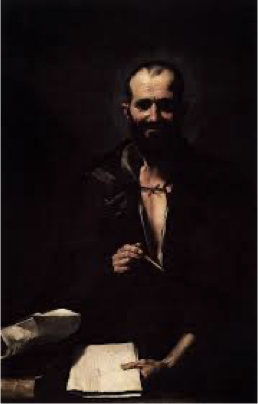
archimedes, ribera, baroque, 17th century, tenerism, homeles man who is actually very smart, laughing at us because he knows he’s smart and we think that he’s dumb
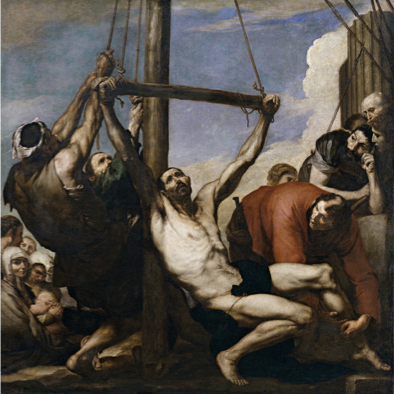
martyrdom of st bartholomew or st philip, ribera, baroque, 17th century, luminism, getting ready to skin him alive, looking up at god asking why
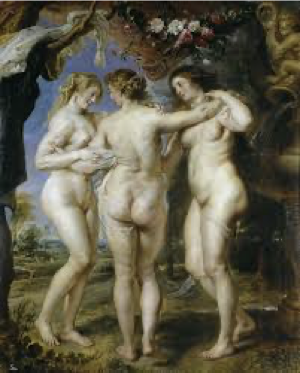
the 3 graces, rubens, baroque, 17th century, luminism, womanly figures
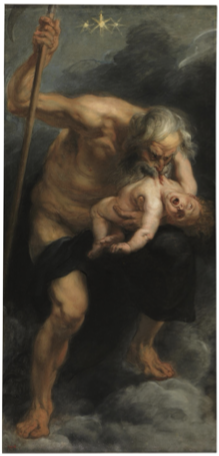
saturn devours his son, rubens, baroque, 17th century, same story as goya one
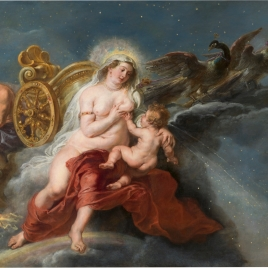
the birth of the milky way, rubens, baroque, 17th century, breastfeeding turns into the milky way
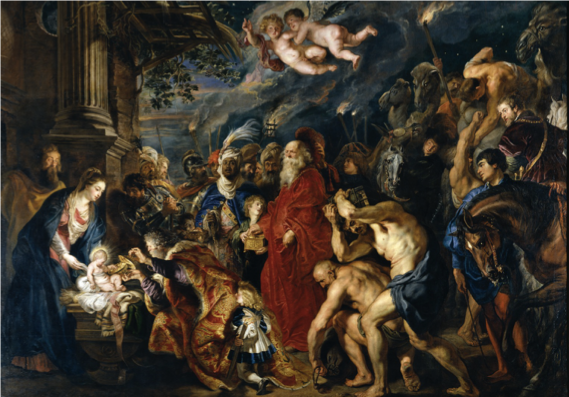
adoration of the magi, rubens, baroque, 17th century
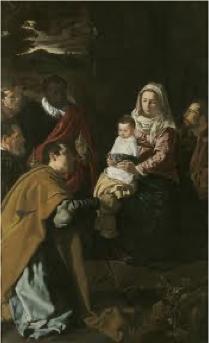
adoration of the magi, velazquez, baroque, 17th century, very skilled when he was young, self-portrait with his wife as the virigin mary, his daughter, his family members
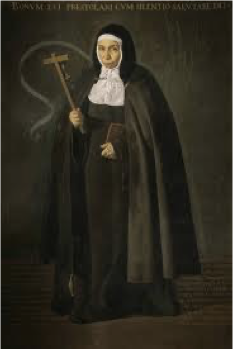
sor jeronima de la fuente, velazquez, baroque, 17th century, cranky nun = tiene mal a leche (tasted bad milk)
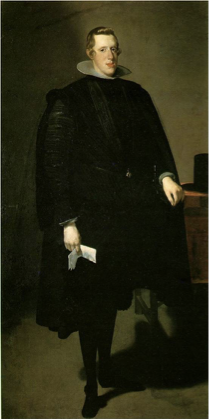
philip IV, velazquez, baroque, 17th century, royal painter for the king when he realized he was a genius and very good artist, can see the changes visible to the naked eye (arrenpentimientos), he never sketched but would just start painting directly on the canvas
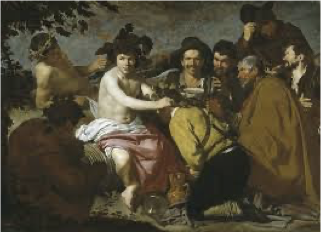
los borrachos (the feast of baccus), velazquez, baroque, 17th century, “the drunks,” hiding mythology with reality by painting drunk men, illegal to paint mythology because of the nudity = rules of the church, influenced by rubens to switch from tenebrism to luminism after going to italy, arrepentimientos visible to the naked eye
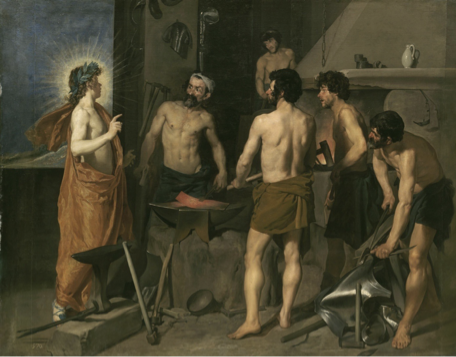
the vulcan forge, velazquez, baroque, 17th century, first trip to Italy, Apollo shining, excuse to analyze male anatomy, men’s faces in shock
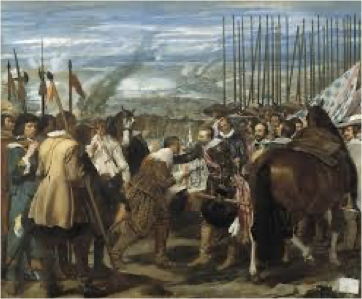
surrender of breda (las lanzas), velazquez, baroque, 17th century, comeback to madrid inspired by his visit to Italy
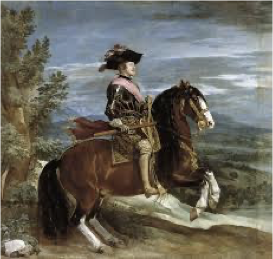
equestrian portrait of philip IV, velazquez, baroque, 17th century, statue of the king on horseback in madrid
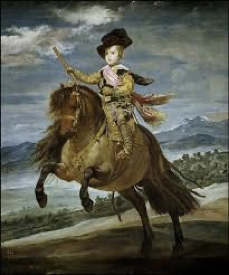
equestrian portrait of prince baltasar carlos, velazquez, baroque, 17th century, small horse but is a pony
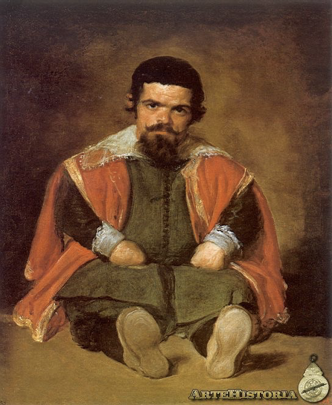
bufones, velazquez, baroque, 17th century, first time a respectful portrait of little people (disabilities, mental) was made, sometimes out of focus to not highlight the disability
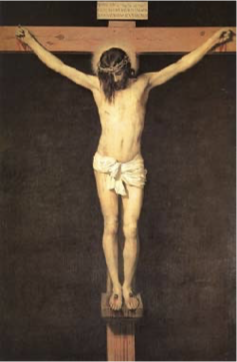
jesus on the cross, velazquez, baroque, 17th century, tenebrism after Italy because he learned about anatomy and where light hits
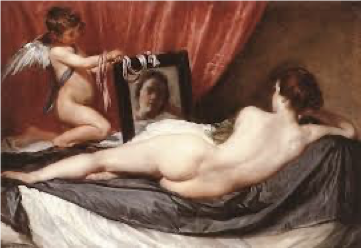
venus (at her mirror) and cupid , velazquez, baroque, 17th century, he met an Italian woman, fell in love with her, and had a child with her, this depiction of venus could be this woman
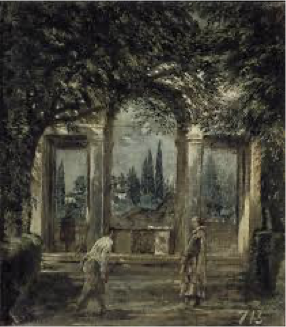
views of villa medici, velazquez, baroque, 17th century, precedent of impressionism,
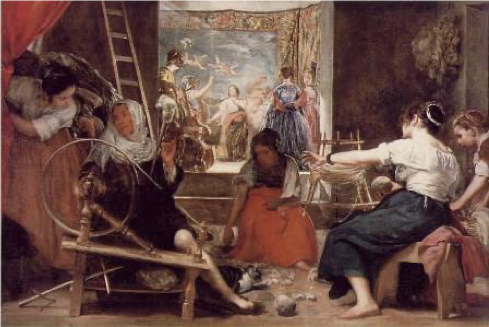
the spinners (fable of pallas athenea and aracne), velazquez, baroque, 17th century, painting the working class, juxtapose the people working in the front to the elegant people in the background, can see the movement of the wheel, illustrates myth of arachne (mortal woman challenged the goddess of athena to a weaving contest), hiding mythology with reality
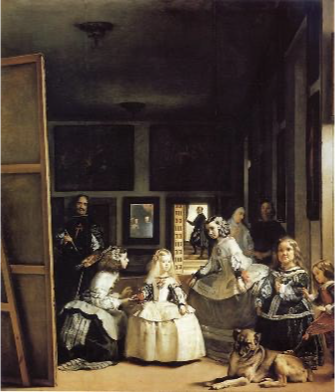
las meninas, velazquez, baroque, 17th century, the little girls/ladies in waiting, little people being painted not as a joke but seriously, painted himself into the painting, looking at us, we are the royal family (can see them walking in in the mirror in the back)
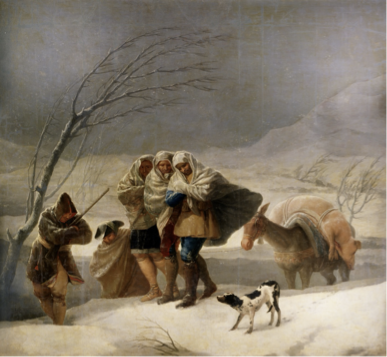
the 4 seasons, goya, end of 18th beginning of 19th century, goya, cartoon made to be turned into a tapestry to be hung in the royal palace but kept the cartoons just in case something happened to the tapestry, fall = harvest of grapes, September October, spring = flowers, bunny, winter = kill the animals in December to cure the meats and dry them, was trying to sell meat in another town illegally without taxes but got caught by police, can see dog scared with tail between the legs,
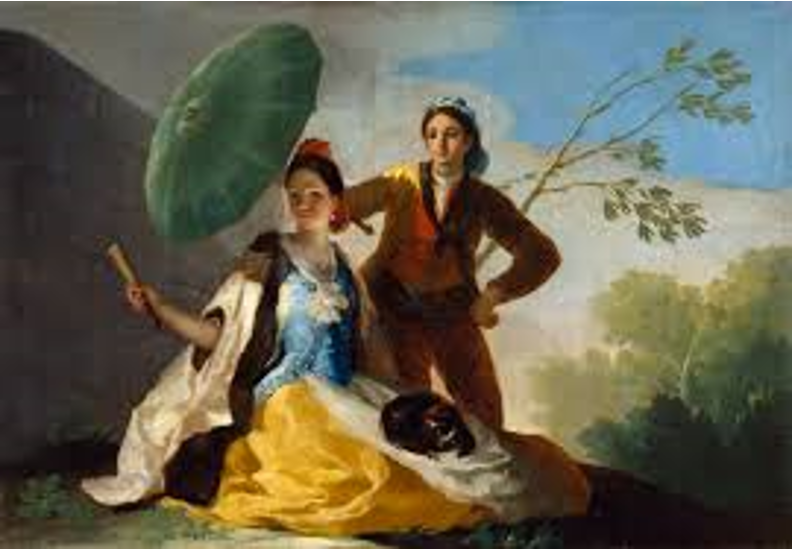
the parasol, goya, end of 18th beginning of 19th century, goya, cartoon made to be turned into a tapestry to be hung in the royal palace but kept the cartoons just in case something happened to the tapestry
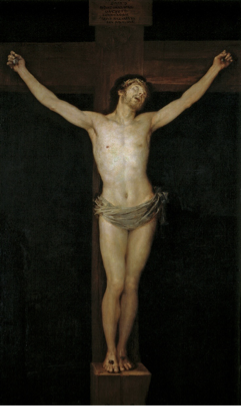
jesus on the cross, goya, end of 18th beginning of 19th century, goya, religious painting, 4 nails instead of 3 diminishes emphasis on devotional features, wanted to please the academicians, looking up to god asking why
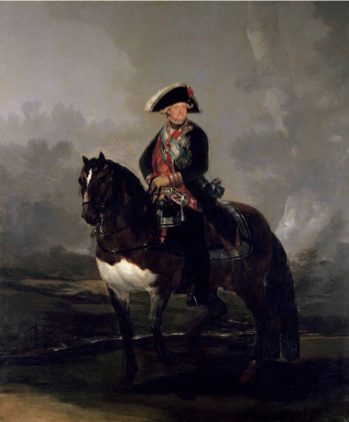
equestrian portrait of carlos IV, goya, end of 18th beginning of 19th century, goya, king in a dynamic pose, light and shadow emphasize the subjetc’s power and status
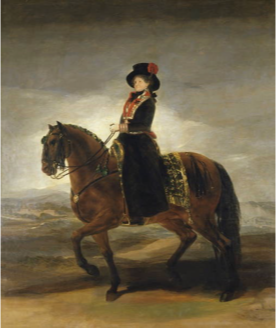
equestrian portrait of maria luisa de parma, goya, end of 18th beginning of 19th century, goya, high-status sitter
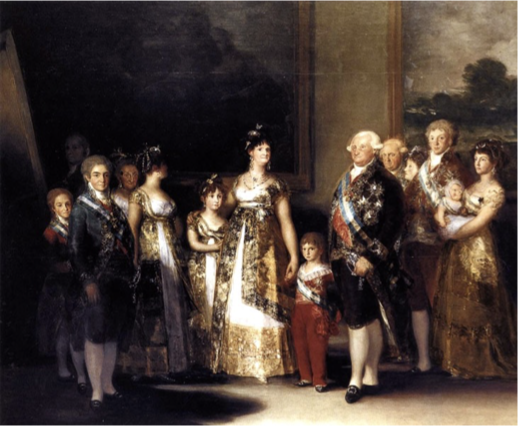
family of carlos IV, goya, end of 18th beginning of 19th century, goya, queen was having an affair with the prime minister and had 6/18 children survive, queen hated her grandson because he was always crying so goya put him in to piss her off, painted what she actually looked like = deformed (because she has 18 kids), paints himself in the same space as the royal family and on the same level height wise = they are equals, whole painting to criticize the monarchy and royal family
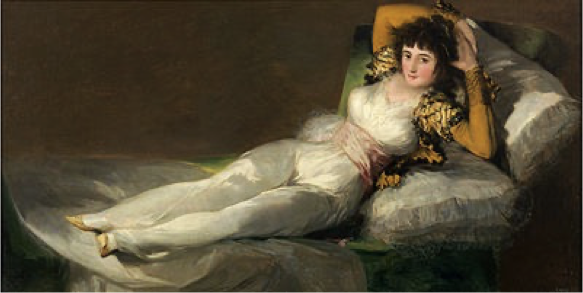
dressed maja, goya, end of 18th beginning of 19th century, goya, paint mechanism to make her clothed on top but naked underneath, more sfumata and less outline in the dressed maja
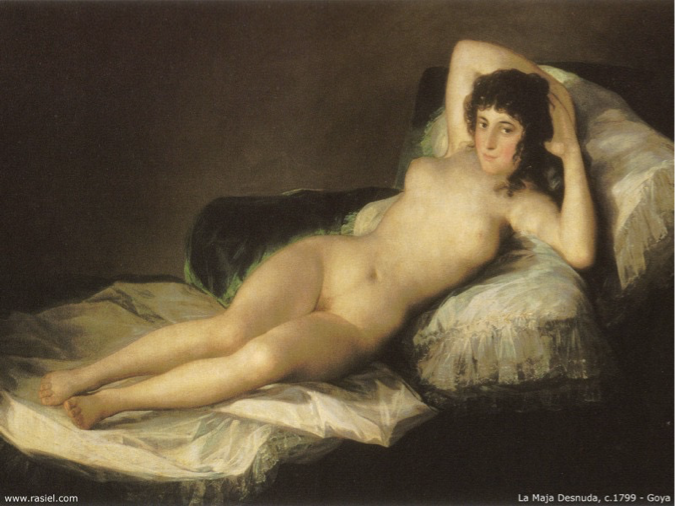
naked maja, goya, end of 18th beginning of 19th century, goya, first time not covering up the nudity with mythology, she isn’t covering her body and is looking directly at the viewer, first painting of a woman with pubic hair = she is a real woman, paint mechanism to make her clothed on top but naked underneath, naked has more outline and more sold, theories of who the woman is but we don’t know
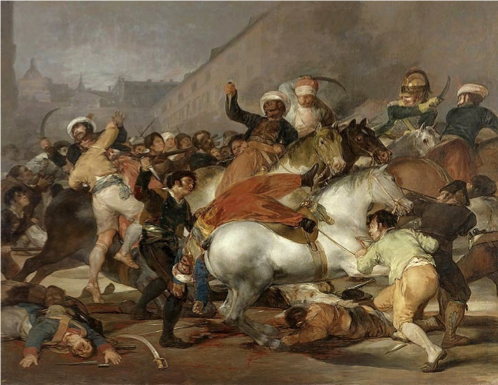
may 2nd 1808, goya, end of 18th beginning of 19th century, goya, painting of war, about napoleon invasion and attacking portugal
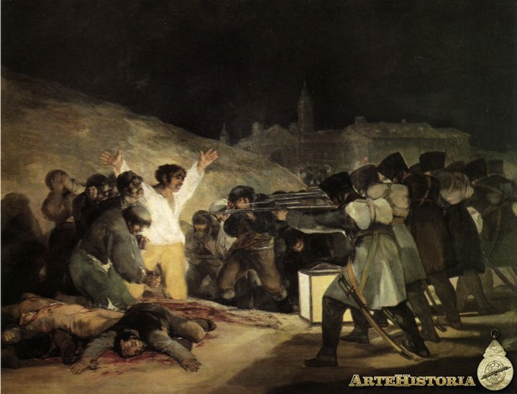
may 3rd 1808, goya, end of 18th beginning of 19th century, goya, painting of war, about napoleon invasion and people being executed
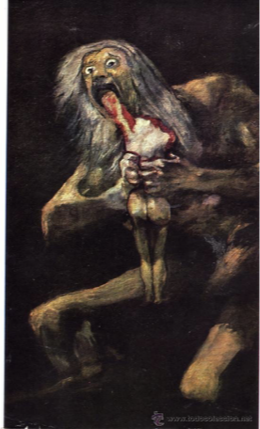
saturn devouring his son, goya, end of 18th beginning of 19th century, goya, black painting, roman god saturn feared that his children would overthrow them so he ate them, but one of his sons zeus) is saved and eventually overthrows saturn, becoming the ruler of the gods
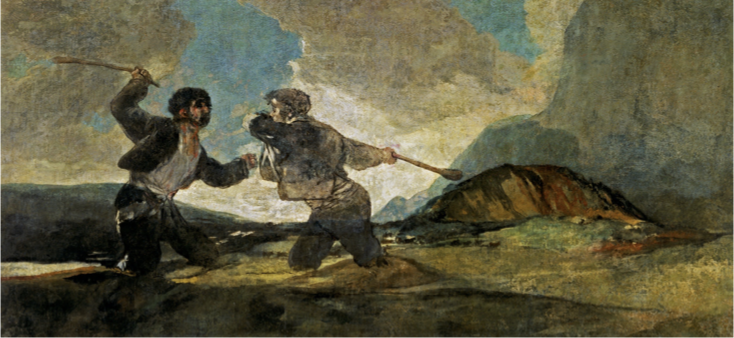
duel with clubs, goya, end of 18th beginning of 19th century, goya, black painting, fighting over a woman, symbolize the bulls in the back
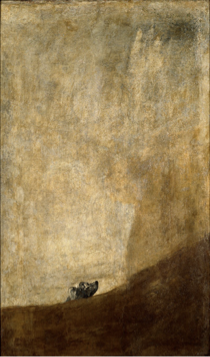
half-submerged dog, goya, end of 18th beginning of 19th century, goya, black painting, looking for something outside what we can see in the painting, image of loneliness, abandonment, neglect
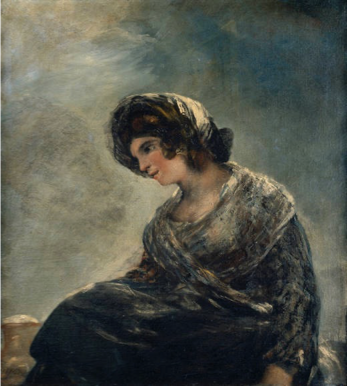
milkmaid of bourdeaux, goya, end of 18th beginning of 19th century, goya, exile painting, believed to be one of his last works and completed the year before his death, believed to be a portrait of the daughter of the woman who cared for him in Bordeaux (may have been his daughter)
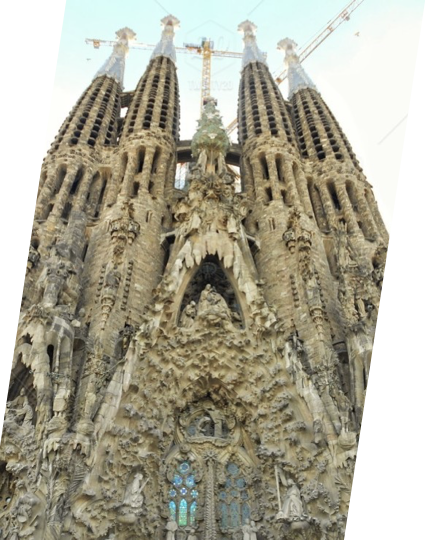
sagrada familia, modernism, beginning of 20th century, gaudi, took a long time to build because only funded with donations and charity, means sacred family
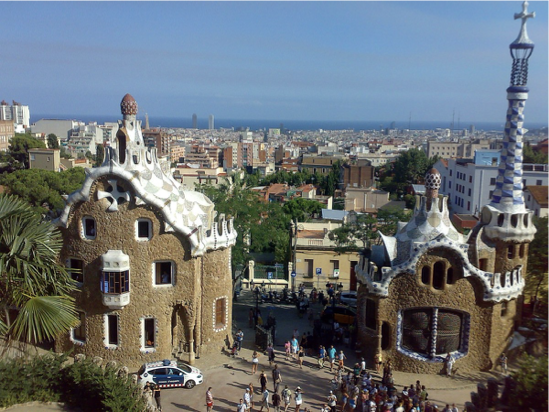
park guell, modernism, beginning of 20th century, gaudi, new style of architecture, combination of the architecture with nature, benches perfectly molded to your back
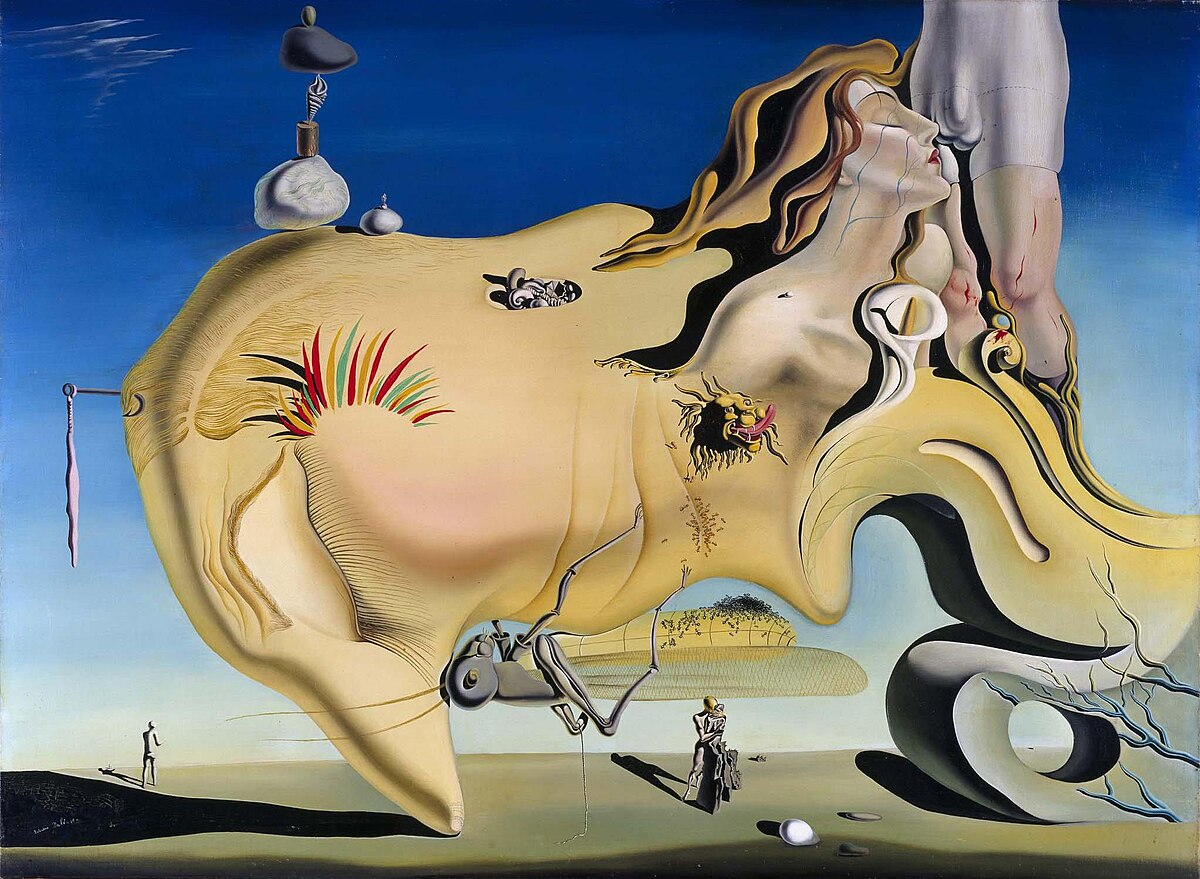
the great masturbator, surrealism, 20th century, dali, about dali’s impotence and internal struggle with his wife/muse gala being a nympho, ants symbolize a dream he had about ants eating off his genitals, can see gala close to his genitals but nothing happening showcasing his direct impotence
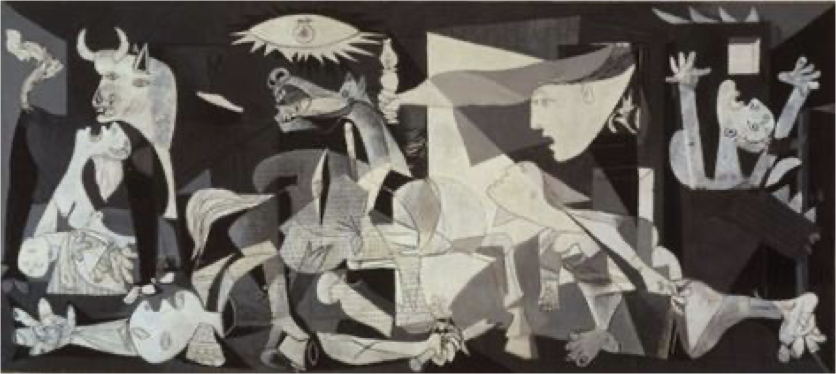
guernica, cubism, 20th century, picasso, wasn’t a military target but just a typical village - first time this had ever happened so devastating, mom holding baby’s corpse, building on fire, lightbulb symbolizing new bomb, pieces of newspaper, horse’s tongue looks like a rocket/missile, black dove symbolizing lack of peace